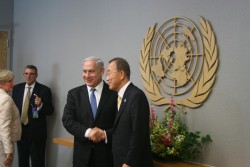
Ready for a peaceful handshake? Prime Minister Netanyahu (Left) and UN Sec-Gen Ban. Illustrative. By Joshua Spurlock
Despite the Palestinian political system’s state of turmoil surrounding the resignation of yet another prime minister, that hasn’t changed Israel’s desire to reach peace with their neighbors. Israeli Prime Minister Benjamin Netanyahu on Tuesday said they are “ready” to enter negotiations with the Palestinians “without preconditions.”
“I have to say that our goal is not just to enter and [check the box] to show that we’ve begun negotiations,” a statement from Netanyahu’s office quoted him as saying. “Our goal is to persist in the negotiations, to engage in them consistently over a serious period of time in order to try to grapple with all the issues and come to an agreement that resolves the fundamental issues in the conflict.
Netanyahu’s comments come ahead of another visit from US Secretary of State John Kerry and amidst speculation that a resumption in Israel-Palestinian peace talks may be coming soon. It also comes just days after Palestinian Prime Minister Rami Hamdallah tendered his resignation—the second Palestinian prime minister to resign this year.
While peace in the region would be helpful, past experience has shown that negotiations don’t always bring that. Palestinian extremist groups have launched terror campaigns against Israel—starting some of the worst conflict between the sides—during or shortly after intense periods of negotiations.
In addition, there are concerns that should Israel make a deal with the Palestinians before peace is established on the ground, it could set the stage for the extremist groups to intensify their attacks, using the reduction in Israeli security and military withdrawal in a peace accord. Some in Israel believe the best method would be a cooperative confederation with a grassroots peace in which the Palestinians could govern their own affairs under Israeli sovereignty, rather than a peace deal and land compromise.
While Netanyahu has embraced the land-for-peace model, he does appear to understand that it takes two to make peace. “Our fervent hope is for peace, a genuine peace that can be achieved only through direct negotiations without preconditions… This will require time and determination and a systematic approach and I hope that this is what the Palestinians will have. That’s our approach. I hope it’s theirs too.”
(By Joshua Spurlock, www.themideastupdate.com, June 26, 2013)
